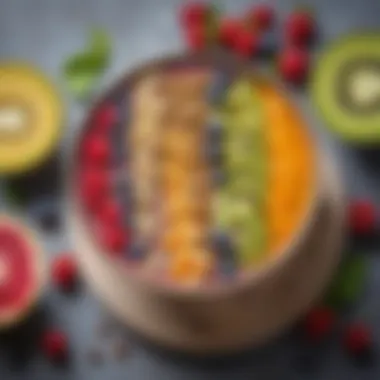Nutritional Foundations for Optimal Hair Growth


Intro
Understanding the nutritional impact on hair growth is vital for anyone looking to enhance their hair's vitality. Hair health is not solely determined by external treatments; what we consume daily plays a pivotal role. This comprehensive guide will explore the specific nutrients that contribute to healthy hair growth and examine food groups that supply these essential components. Nutrients such as proteins, vitamins, and minerals form the backbone of hair health, influencing factors from growth rates to hair structure.
Moreover, we will outline practical ways to incorporate these food choices into your everyday meals. Emphasizing a balanced diet can empower individuals to make informed decisions that support not just their hair, but overall wellness. The relationship between what we eat and how our hair grows will become clearer as we delve into the core aspects of nutrition that enhance hair vitality.
Understanding the Science of Hair Growth
Understanding the scientific principles underlying hair growth is crucial when discussing hair health and nutrition. Many people do not connect their diet with the vitality of their hair. This section aims to bridge that gap by elucidating the mechanisms of hair growth and revealing how specific nutritional choices can enhance this process.
The hair growth cycle itself is composed of three primary phases: anagen, catagen, and telogen. Each phase plays a distinct role in hair development and overall health. Recognizing how these phases function can inform one's dietary decisions, highlighting the link between nutrients and hair resilience.
The Hair Growth Cycle
The hair growth cycle is fundamentally composed of three stages. First, there is the anagen phase, where hair actively grows. This phase can last for several years, and the cells in the hair root are highly active. Nutritional support is vital during this time to ensure optimal growth.
Next, the catagen phase is a brief transitional period where hair growth ceases. It lasts about 2-3 weeks. Finally, we reach the telogen phase. This resting stage can last for several months before the hair falls out and a new hair begins to grow in its place. A proper understanding of this cycle underscores the importance of continuous nutrient intake for maintaining healthy hair throughout these stages.
Factors Influencing Hair Health
Numerous elements impact hair health. These factors include genetics, hormonal changes, and environmental influences, all of which can significantly affect hair growth and overall aesthetic appeal.
Genetics
Genetics plays a significant role in determining the characteristics of an individual's hair. This includes everything from color and thickness to density and growth speed. Many individuals may find that hereditary factors greatly influence how their hair responds to various treatments, including dietary interventions. Understanding your genetic predispositions can guide you to make informed dietary choices that complement your unique hair structure, making certain nutrients more beneficial based on your genetic background.
Hormonal Changes
Hormonal changes are another critical factor affecting hair health. Fluctuations can result from various life events such as pregnancy, menopause, or stress. Hormones like androgens can negatively impact hair follicles, leading to thinning or loss. Recognizing the role of hormones can help in selecting foods that stabilize hormone levels, thus promoting a more favorable environment for hair growth. For example, incorporating foods high in omega-3 fatty acids can help mitigate some of the adverse effects of hormonal imbalances.
Environmental Influences
Lastly, environmental influences also play a crucial role in hair health. Factors such as pollution, UV exposure, and climate can cause damage to hair follicles and strands, resulting in weakened growth. Individuals may consider integrating antioxidant-rich foods into their diet to combat some of these effects. Antioxidants can neutralize harmful free radicals, supporting healthier hair. A well-rounded diet that pays attention to these external factors can lead to noticeable improvements in hair quality over time.
Nutrition has an undeniable connection to hair growth, influencing everything from the hair growth cycle to hair's response to environmental stressors.
Essential Nutrients for Hair Growth
Understanding essential nutrients is critical for anyone interested in promoting hair growth and overall hair health. Hair is predominantly composed of proteins, particularly keratin. Therefore, adequate intake of proteins is fundamental. Furthermore, several vitamins and minerals play pivotal roles in maintaining hair strength, stimulating growth, and preventing hair loss.
A balanced diet containing these nutrients not only supports the hair but also contributes to overall well-being. Individuals often overlook the significance of dietary choices in relation to hair health. Yet, developing an awareness of these nutrients can foster informed eating habits conducive to vibrant, healthy hair.
Proteins: Building Blocks of Hair
Proteins are vital as they serve as the foundational element for hair structure. Hair proteins, predominantly keratin, are essential for hair health and integrity.
Types of Hair Proteins
The primary types of hair proteins include keratin, collagen, and elastin. Keratin is the most crucial protein in hair and provides strength and structure. The presence of amino acids, which are the building blocks of proteins, is beneficial for hair repair and resilience. Collagen plays an indirect role by promoting blood circulation to hair follicles, while elastin maintains hair flexibility. Each type contributes uniquely to hair vitality and resilience in different aspects.
Plant-Based Sources
Plant-based sources of protein include legumes like lentils and chickpeas, nuts, and quinoa. These are excellent options for individuals following vegetarian or vegan diets. They not only provide necessary proteins but are often rich in other essential nutrients such as fiber, vitamins, and minerals. The unique feature of these sources is their ability to provide protein while also promoting a heart-healthy lifestyle. However, they may lack certain amino acids that are more abundant in animal sources, requiring a combination of foods to meet protein needs effectively.
Animal-Based Sources


Animal-based sources such as chicken, fish, and eggs are rich in high-quality proteins that contain all essential amino acids. These proteins contribute directly to hair strength and growth. The key characteristic of these sources is their efficiency in protein synthesis, making them popular choices for promoting hair health. However, overconsumption of processed animal products can have negative health impacts, so moderation is essential in any diet.
Vitamins: Roles in Hair Health
Vitamins are essential for promoting hair health. They play critical roles in cellular functions and metabolic processes necessary for hair growth.
Vitamin A
Vitamin A is significant for cell growth, including hair cells. It helps in the production of sebum, a natural oil that moisturizes the scalp. A deficiency in vitamin A may lead to hair loss. Its sources include sweet potatoes, carrots, and spinach. Despite its benefits, excessive intake can lead to toxicity, so moderation is crucial.
Vitamin E
Vitamin E acts as an antioxidant, helping protect the hair from oxidative stress. It supports blood circulation in the scalp, promoting healthy hair follicles. Nuts, seeds, and green leafy vegetables are good sources. While it is beneficial, excessive use of supplements can sometimes lead to health risks, so obtaining this vitamin through diet is advisable.
Biotin
Biotin is often touted for its positive effects on hair growth. It aids in synthesizing keratin, the primary component of hair. Foods rich in biotin include eggs, almonds, and sweet potatoes. Its unique feature lies in its role in cellular metabolism. While biotin deficiency can lead to hair thinning, supplementation without deficiency may not yield significant improvements.
Minerals: Strengthening Hair Strands
Minerals are as crucial as vitamins in sustaining hair health. Excellent mineral intake can strengthen hair and prevent breakage.
Iron
Iron plays a vital role in transporting oxygen to hair follicles, supporting healthy growth. A deficiency can lead to hair loss. Sources include red meat, beans, and fortified cereals. Although beneficial, excessive iron intake can have adverse effects, so it is best to consume iron in moderation through a balanced diet.
Zinc
Zinc is essential for tissue growth and repair, making it important for hair health. It helps maintain the oil glands around hair follicles, promoting a healthy scalp. Good sources include meat, shellfish, and lentils. Zinc excess can lead to hair loss, so it is important to maintain a balanced intake.
Magnesium
Magnesium supports numerous biological functions and can contribute to hair health by preventing hair loss and supporting growth. Dark leafy greens, nuts, and whole grains are rich sources. While it has several benefits, individuals may require a wide range of nutrients, and relying solely on magnesium for hair health is insufficient.
Identifying Food Sources for Hair Growth
Understanding the specific food sources that support hair growth is critical in achieving optimal hair health. These sources are rich in essential nutrients, particularly proteins, vitamins, and healthy fats. Each nutrient plays a crucial role in maintaining or enhancing hair vitality. By focusing on dietary choices that incorporate these nutritional elements, one can support not only the growth of hair but also its overall strength and appearance.
Protein-Rich Foods
Legumes
Legumes, such as lentils, chickpeas, and beans, are excellent sources of protein. This macronutrient is vital for hair growth as hair is primarily made up of keratin, a protein. The high protein content in legumes contributes to the overall development of hair strands. Additionally, legumes provide iron and zinc, which are both important for maintaining healthy hair. They are a popular choice due to their affordability and versatility in meals.
Legumes are also easy to digest and can be included in various dishes. One unique feature of legumes is their ability to support muscle repair and growth, making them beneficial for those who engage in physical activities. However, some people may experience digestive discomfort when consuming legumes, which is a minor disadvantage.
Nuts and Seeds
Nuts and seeds are powerful sources of healthy fats and proteins. They contain essential fatty acids, particularly omega-3s, which are known to nourish the hair follicles. Almonds, walnuts, and flaxseeds are often recommended for their rich nutrient profile. The key characteristic of nuts and seeds is their high content of vitamin E, which is an antioxidant that helps protect hair from damage.
Including a handful of nuts or seeds in your diet is simple. They make great snacks or additions to salads and smoothies. However, it is important to consume them in moderation due to their high caloric content, which may contribute to weight gain if overeaten.
Lean Meats
Lean meats, such as chicken, turkey, and fish, are significant sources of protein and other vital nutrients. They are particularly rich in iron and zinc, both of which play essential roles in hair health. The key characteristic of lean meats is their high absorbability. The body easily assimilates the protein from meats, which enhances the building blocks for hair development.


Including lean meats in your diet is straightforward. They can be grilled, baked, or stir-fried, providing a versatile protein option. A downside or consideration is that some individuals may choose to avoid meat for ethical, health, or dietary preferences, leading to a possible deficiency in these nutrients if not balanced with alternatives.
Vitamin-Packed Fruits and Vegetables
Citrus Fruits
Citrus fruits, such as oranges, lemons, and grapefruits, are rich in vitamin C, an essential nutrient for hair health. Vitamin C aids in the absorption of iron, a critical mineral for optimal hair growth. The key characteristic of citrus fruits is their refreshing taste and high water content, promoting hydration as well. Their high antioxidant properties help combat oxidative stress, protecting hair follicles from damage.
Incorporating citrus fruits into the diet is easy. They can be consumed whole, juiced, or added to salads. One challenge is their acidity, which might irritate sensitive stomachs for some individuals, though this is generally not an issue for most people.
Leafy Greens
Leafy greens, including spinach, kale, and collard greens, are another vital food group for hair health. These greens are packed with vitamins A and C, which are essential for the health of hair follicles. The unique feature of leafy greens is their richness in plant-based iron and calcium, contributing to overall nutrition while promoting hair growth.
Eating leafy greens can be done in numerous ways, such as in salads, smoothies, or cooked dishes. However, the taste might not appeal to everyone, which can lead to lower consumption.
Sweet Potatoes
Sweet potatoes stand out for their high content of beta-carotene, a precursor to vitamin A. This vitamin is vital for the production of sebum, the natural oil that keeps hair moisturized. The key characteristic of sweet potatoes is their natural sweetness and versatility in meals. They can be baked, mashed, or added to stews.
One advantage is that they are low in calories but high in nutrients, making them a perfect addition to any diet. However, those watching their carbohydrate intake should be mindful of portions as sweet potatoes can be higher in sugars compared to other vegetables.
Healthy Fats for Hair Nourishment
Avocado
Avocados provide healthy monounsaturated fats and are rich in vitamins E and C. These nutrients play a significant role in nourishing hair and promoting healthy growth. The buttery texture of avocado makes it a popular choice in both savory and sweet dishes. The unique feature of avocado is its ability to improve scalp hydration and fullness of hair strands.
Avocados can easily be included in a diet, from salads to spreads. However, they are high in calories, so moderation is important.
Olive Oil
Olive oil is known for its heart-healthy properties and is an excellent source of antioxidants. It is rich in oleic acid, which may help improve hair texture and shine. The key characteristic of olive oil is its versatility; it can be used in dressing, cooking, or even as a hair treatment in moderation.
One of the unique advantages of olive oil is its anti-inflammatory properties, which can benefit scalp health. However, it's important to use cold-pressed varieties for maximum benefits, as refined oils may lack essential nutrients.
Fatty Fish
Fatty fish, such as salmon, mackerel, and sardines, are rich in omega-3 fatty acids, which are vital for scalp health and hair shine. These fish also provide high-quality protein, vitamins D and B, which stimulate hair follicles. The unique feature of fatty fish is their nourishing properties that promote a healthy environment for hair growth.
Eating fatty fish multiple times a week can provide these beneficial nutrients. However, one should be cautious about mercury levels in certain types of fish. Sourcing from sustainable fisheries can help mitigate this issue.
Integrating Hair-Healthy Foods into Your Diet
Incorporating hair-healthy foods into one's diet is essential for promoting robust hair growth and overall hair health. Nutritional practices significantly impact the growth cycle and health of hair strands. When individuals focus on systematic integration of these foods, not only do they nourish their hair, but they also enhance their general well-being. Understanding how to achieve this integration can simplify dietary choices and foster consistency in healthy eating habits.
Creating Balanced Meals
Balanced meals are critical for providing the necessary nutrients that support hair growth. Each meal should ideally include a mix of proteins, vitamins, and healthy fats. For example, a well-rounded dish could feature grilled salmon, quinoa, and a side of steamed broccoli. This combination offers protein from salmon, important minerals from quinoa, and vitamins from broccoli, each playing a distinct role in enhancing hair vitality.
Consider the following when assembling balanced meals:
- Portion Control: Ensure that the amounts of each food group are appropriate.
- Variety: Include different colors of vegetables and fruits to cover a broader spectrum of nutrients.
- Whole Foods: Prioritize whole, minimally processed foods to benefit from their full nutritional profile.
Meal Prep Tips for Nutrition


Meal prep can facilitate the consistent consumption of hair-healthy foods. Planning meals in advance helps avoid impulse choices that may not align with health goals. Here are some practical tips:
- Plan Weekly Menus: Dedicate time to create a weekly meal plan, focusing on including high-protein and vitamin-rich foods.
- Batch Cooking: Prepare large quantities of versatile ingredients, such as lentils or grilled chicken, to use in different dishes throughout the week.
- Storage Options: Invest in quality containers to store cooked meals and snacks, making them easy to access.
Sample Meal Ideas for Hair Health
Implementing hair-nourishing meals can be straightforward with the right ideas. Here are some specific meal suggestions:
- Breakfast: Greek yogurt topped with walnuts and slices of banana.
- Lunch: Spinach salad with chickpeas, feta cheese, and a drizzle of olive oil.
- Dinner: Stir-fried tofu with brown rice and a mix of bell peppers, broccoli, and carrots.
- Snacks: Hummus with sliced cucumbers or carrots.
Additional Considerations for Hair Growth
When discussing hair growth, it is essential to focus on more than just nutrition. Several factors play a significant role in determining the health and vitality of hair. These considerations include hydration, environmental impacts, and lifestyle choices. Each element influences not only the growth process but also the overall condition and appearance of hair. Understanding these factors provides a well-rounded perspective and can lead to better strategies for promoting hair health.
Hydration and Hair Health
Water is often overlooked in discussions about hair growth, yet hydration is crucial. Consuming adequate water supports overall health, including hair follicles. Proper hydration ensures that nutrients from food are delivered efficiently to hair cells. This process enhances the strength and appearance of hair, preventing it from becoming brittle or dry. The scalp also benefits from hydration, potentially reducing issues such as flakiness and itchiness. A common guideline suggests drinking at least eight glasses of water daily, but individual needs might vary based on activity level and climate.
Environmental Factors and Hair Integrity
Environmental influences can have profound effects on hair health. These factors include exposure to pollution, UV rays, and harsh weather conditions. Pollutants may compromise the hair's natural barrier, leaving strands more vulnerable to damage. Similarly, UV radiation can weaken the hair structure, leading to dryness and discoloration. Strategies like wearing protective hairstyles or utilizing UV-blocking hair products may help mitigate these effects. It is also wise to adopt a routine that incorporates cleansing and conditioning products designed to combat environmental damage.
Lifestyle Choices Impacting Hair Growth
Stress Management
Stress is known to trigger various hair issues, including thinning and loss. High levels of stress lead to the release of hormones that can disrupt hair growth. Managing stress effectively is important for maintaining healthy hair. Techniques such as meditation, exercising, and engaging in hobbies can assist in reducing stress levels. Incorporating these practices into daily life can promote not only hair health but overall well-being. Thus, minimizing stress has both immediate and long-term benefits for hair vitality.
Sleep Quality
Sleep is another crucial factor for hair health. During sleep, the body undergoes multiple repair processes. These processes include hair follicle rejuvenation and nutrient absorption. Lack of adequate sleep can hinder these processes, impacting hair growth negatively. A consistent sleep schedule and practices such as a calming bedtime routine can help improve sleep quality. Prioritizing rest is beneficial not just for hair but for cognitive function and physical health as well.
Avoiding Harsh Chemicals
Many products used for hair care contain harsh chemicals that can damage hair over time. Ingredients like sulfates, parabens, and alcohols often strip hair of its natural oils, leading to dryness and breakage. Choosing more natural or organic hair products may reduce these risks. Reading labels and opting for chemical-free alternatives is a recommended approach. While transitioning to gentler products may take some adjustment, the long-term advantages for hair health make this choice worthwhile.
In summary, addressing hydration, environmental factors, and lifestyle choices is key for nurturing healthy hair. Each consideration interacts with nutrition, creating a holistic approach to hair wellness.
Closure
Integrating these additional considerations into a nutritional framework provides an overall strategy to support hair growth. By understanding and addressing the many facets of hair health, individuals can foster a more vibrant mane that reflects their best self.
The End: The Path to Healthier Hair Through Nutrition
Proper nutrition forms the foundation of healthy hair growth and vitality. By focusing on the right nutrients, individuals can significantly enhance their hair's strength, shine, and overall appearance. This conclusion wraps up the important insights shared throughout the article, highlighting the vital role food choices play in achieving optimal hair health.
Summarizing Key Nutritional Takeaways
In summary, various nutrients are essential for supporting hair growth. They include:
- Proteins: Hair is primarily made of keratin, a type of protein. Consuming sufficient protein from sources like chicken, fish, beans, and nuts is crucial for the structural integrity of hair strands.
- Vitamins: Essential vitamins, particularly Vitamin A, Vitamin E, and Biotin, are critical for maintaining scalp health and promoting hair growth.
- Minerals: Iron, Zinc, and Magnesium play a significant role in hair's growth cycle. They help deliver oxygen to hair follicles, which supports robust hair production.
Integrating these nutrients into daily meals fosters not just hair health but also overall well-being. A balanced diet enriched with these foods can lead to improved hair density and reduced hair loss.
Long-Term Dietary Changes for Lasting Results
Adopting long-term dietary changes ensures that hair maintains its health over time. Temporary fixes or crash diets may yield short-term effects but tend to fall short in sustaining hair vitality.
To effect lasting results, consider the following strategies:
- Consistent Meal Planning: Design meal plans that include a variety of protein sources, fruits, and vegetables. This diversified approach helps in consistently obtaining the necessary nutrients.
- Mindful Eating Habits: Maintain awareness of food choices. Being selective with ingredients is vital. Opt for whole foods and minimize processed items.
- Hydration Maintenance: Drinking adequate water complements nutrient intake. This supports blood circulation, ensuring nutrients efficiently reach hair follicles.
- Regular Health Check-ups: Monitoring health can help identify any deficiencies early on. Consulting with healthcare providers ensures that dietary choices align with individual health needs.
Incorporating these changes is a long-term commitment. However, the results of healthier hair become evident and can significantly boost confidence and self-image. By prioritizing nutrition, one can unlock the potential for vibrant, flourishing hair.







